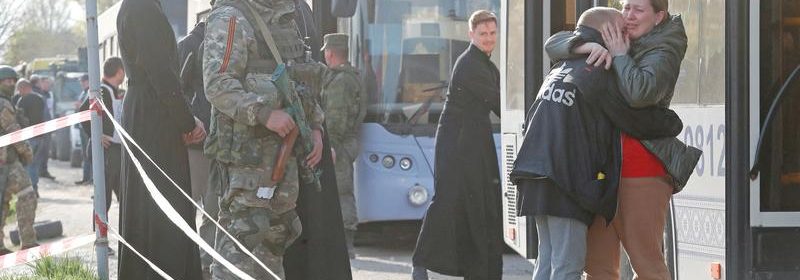Civilians evacuated from Ukraine's Mariupol but many remain trapped

KYIV (Reuters) – An operation to bring civilians out of the devastated Ukrainian port city of Mariupol was under way on Monday but hundreds of people remained trapped in the Azovstal steelworks, the last stronghold of resistance to the Russian siege.
A first group of evacuees was due to arrive in a Ukrainian-held town northwest of Mariupol on Monday morning.
But people still stuck there were running out of water, food and medicine as Russian forces hemmed them into the industrial complex, whose network of bunkers and tunnels has provided shelter from weeks of Russian bombardment.
“The situation has become a sign of a real humanitarian catastrophe,” Ukrainian Deputy Prime Minister Iryna Vereshchuk said.
On the international front, energy ministers from EU countries were due to hold emergency talks to plan a response to Moscow’s demand that European buyers pay for Russian gas in roubles or face their supply being cut off.
While the EU has imposed heavy economic sanctions on Russia in response to its invasion of Ukraine, the issue of Russian energy supplies has posed a dilemma that threatens to crack the united front.
LOOKING EAST
The Russian military is now focusing on crushing resistance in Ukraine’s south and east after failing to capture Kyiv in the early weeks of the war, now in its third month.
Its assaults have flattened cities, killed thousands of civilians and forced more than 5 million people to flee the country. Mariupol, on the Sea of Azov, has become emblematic of the brutality of the war and the suffering of ordinary people.
Russian President Vladimir Putin’s forces are now in control of nearly all the city, linking up Russian-held territory to the west and east.
Around 100 civilians evacuated from the Azovstal steelworks were due to arrive in the Ukrainian-held city of Zaporizhzhia, 230 km northwest of Mariupol, on Monday morning.
“For the first time, we had two days of a ceasefire on this territory, and we managed to take out more than 100 civilians – women, children,” President Volodymyr Zelenskiy said in a nightly video address.
Footage from inside the steelworks showed members of the Azov regiment helping civilians though rubble and on to a bus.
But hundreds of civilians remain trapped inside.
One older evacuee accompanied by young children said survivors were fast running out of food.
“Children always wanted to eat. You know, adults can wait,” she said.
The International Committee of the Red Cross said it was taking part in the evacuation operation along with the United Nations and the parties to the conflict, but said the situation was complex.
More than 50 civilians arrived at a temporary accommodation centre in Russian-controlled territory on Sunday after escaping from Mariupol, a Reuters photographer said.
‘UNTIL VICTORY’
Moscow calls its actions a “special military operation” to disarm Ukraine and rid it of anti-Russian nationalism fomented by the West. Ukraine and the West say Russia launched an unprovoked war of aggression that threatens to spiral into a much wider conflict.
Russian Foreign Minister Sergei Lavrov said on Sunday Moscow only wanted to guarantee the security of pro-Russian Ukrainians in the east and was not demanding that Zelenskiy “give himself up” as a condition for peace.
“We are demanding that he issue an order to release civilians and stop resistance. Our aim does not include regime change in Ukraine,” Lavrov said in an interview published on his ministry’s website.
Ukraine’s military said on Monday Russian forces were trying to take over the eastern town of Rubizhne and prepare an assault on Sievierodonetsk. Further east, Dnipro Governor Valentyn Reznichenko said a Russian missile hit a grain silo, but caused no casualties.
Luhansk region Governor Serhiy Gaidai said three people had been killed by shelling over the past 24 hours.
Two explosions took place early on Monday in Belgorod, the southern Russian region bordering Ukraine, regional governor Vyacheslav Gladkov said. The cause of the blasts was not immediately clear but the Kremlin has accused Ukraine of making cross-border attacks. Gladkov said there were no casualties or damage.
Moscow is pushing for complete control of the Donbas region, where Russian-backed separatists already controlled parts of Luhansk and Donetsk provinces before the invasion.
EU PONDERS MOVES
In Brussels, EU energy ministers were due to meet in a bid find a way out of the dilemma posed by Russian energy supplies, which count for 40% of EU gas and 26% of its oil imports.
Germany and others have so far resisted calls for an abrupt halt to Russian fuel imports for fear of economic damage, while Moscow is demanding that European buyers pay for Russian gas in roubles or face their supply being cut off.
Russia halted gas supplies to Bulgaria and Poland last week after they refused to meet its demand to effectively pay in roubles.
With many European companies facing gas payment deadlines later this month, EU states must clarify whether companies can keep buying the fuel without breaching the EU’s sanctions against Russia.
Payments in roubles can help to shelter Russia’s economy from the impact of sanctions, while the fuel revenues can help finance its military operation. Diplomats said the EU is edging towards a ban on imports of Russian oil by the end of the year.
Source: Read Full Article
